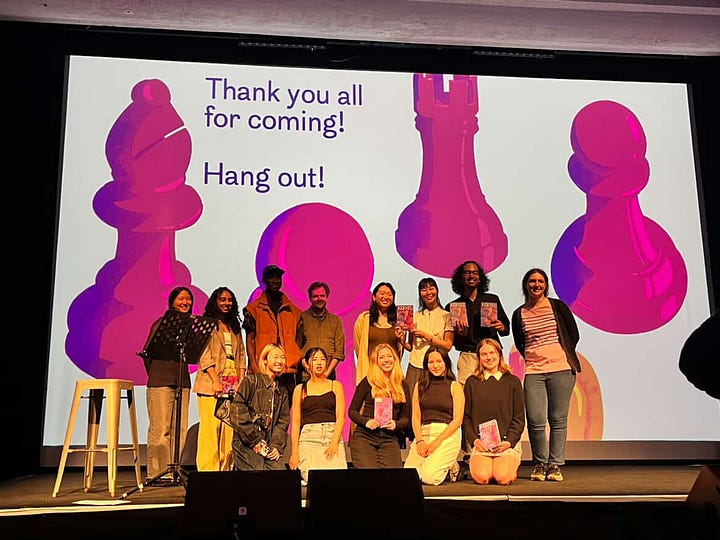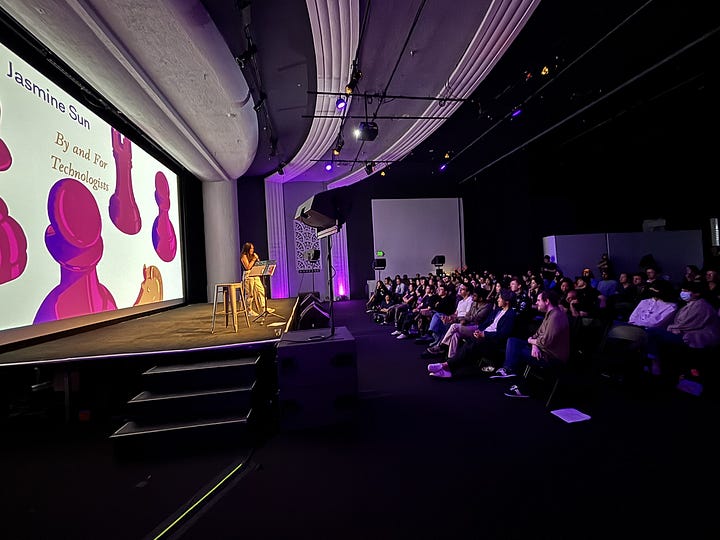TL;DR: Reboot has a new mission: We are a publication by and for technologists. We are also open for pitches (and now pay $750 for newsletter essays!).
Keep reading and listening for more context on how the editorial board came to this decision—this talk was first given at the Kernel 5 magazine launch in San Francisco—and for examples of the kinds of pieces we’d love to have.
Talk: By and For Technologists
Hi! My name is Jasmine, and I’m the director and cofounder of Reboot. Thanks so much for being here. Kernel launch parties are always one of my favorite parts of what we do. Online writing often doesn’t feel real until everyone shows up in physical space together.
Reboot turned five years old earlier this year, which is pretty crazy. Lots of things have changed since jessica dai and I started it as undergrads in 2020—in our lives, in the tech discourse, the industry writ large. Back then we were all talking about Facebook and the end of democracy, or freaking out that OpenAI wasn’t really open because they didn’t release GPT-2.
At the time, Jessica and I started Reboot because it felt urgent to articulate a vision of technology that wasn’t about total refusal or hype. We wanted pragmatic, clear-eyed optimism; and we wanted a community of fellow early-career technologists to think through hard questions with. A recognition that tech is part of our strategy for achieving the goals we want, whether reproductive rights or more fun telephone poles in our communities. In 2021, when we were putting together Kernel’s first issue, I holed up in a lodge in Asheville, North Carolina and wrote a manifesto—“Take Back the Future!”—about what a “progressive techno-optimism” could look like.
Well, a lot more people are talking about “techno-optimism” these days, and tragically not in the way that we meant. We waged a noble battle to reimagine the term, but unfortunately, Andreessen Horowitz has far more money and more Twitter followers than we do. Now, the tech industry has followed Marc’s lead and taken a turn to the right. Log onto x.com, and you’ll find infinite e/acc memes about how everyone who mentions ethics or safety or sustainability is automatically a doomer decel. According to Marc Andreessen’s techno-optimist manifesto, if you’re getting in the way of pure acceleration and profit—no matter the reason why—you are the enemy.
And as I’ve spent more time reporting on Silicon Valley culture this year, one of the trends I’ve been most surprised and disturbed to observe is not merely a shift to the right, but the emergence of a nihilism about whether tech should serve humans at all. Here’s something I hear reasonably often: AGI is going to be so much smarter than us, so we should just hand over the reins and make them our worthy successors. If LLMs can now ace the IMO, why not make them president and CEO too? They should run the institutions, not us. Relatedly: the idea that Mars colonization or Cluely or whatever is some kind of natural, inevitable endpoint to humanity; that regardless of whether a product is something we want, there is a moral duty to bring it into existence—to enact the market’s and technological history’s will. This style of thinking is quite common among high-up people in Silicon Valley. But I think it’s low-agency and anti-human, to say the least.
Reboot’s editorial board has been talking about how our publication should position ourselves in this strange moment. And the forcing function came to this: How many more times do we want to repeat, “Not that kind of techno-optimism”?
I have always defined “techno-optimism” not as an uncritical belief that more technology equals more good—but rather optimism as agency, a faith that humans, as the builders of tools, can shape these incredible forces to achieve the values and goals that we define. Sand does not think until we make it. Modern civilization has always been about finding social and technological solutions to bring out the better angels of our nature—to transcend our monkey-brains and pursue our higher values and aspirations. For Reboot’s next era, we want to re-center the human and the intentional act of creating. Technology is something we do to the world, it is something we choose, and we humans are responsible for those choices.
That leads us to a new mission: Reboot is a publication by and for technologists.
I view this as less a shift than a clarification.
In short: a technologist is anyone who exercises agency to shape technologies toward their goals. It’s a mindset, not a job title; an orientation, if you will. It includes many software engineers and founders, of course, but also makers of home-cooked apps and clever Zapier workflows, hacktivists and traffic cam artists. It’s an orientation of active play, not passive consumption. It combines the critic’s eye for spotting the flaws in a system with the artist’s or entrepreneur’s creative solutions. It’s not just posting about the problem but doing something about it. The technologist says: These systems were made once and they can be remade again. The world is a museum of passion projects. I will not accept things as they come out of the box. As Kevin wrote in his Kernel 5 editor’s note, technologists are players of infinite games.
Reboot will continue publishing essays, interviews, and other creative works by technologists. We believe in lived experience and tacit knowledge; the deep understanding that comes from the personal experience of being “close to the machine,” as Ellen Ullman described in her memoir of the same name. As editors, we’ve noticed that both hype and doom deal in vague, sweeping proclamations. Most people who believe AGI will cure cancer or start WW3 tomorrow have worked neither in medicine nor in military strategy. Thus, we view the specificity of technologists’ experience—the fact that they know intimately where tools work versus don’t, how to tweak them to work a bit better—as a potent vaccine against bad ideas.
As always, we are especially excited to work with people who are not professional writers. We want to develop ideas from practitioners: people doing stuff on the ground. Field-building manifestos, essays about projects you’ve built, and interviews (anonymous or otherwise) with the people doing the most interesting, challenging work in the space.
We are also more than doubling our newsletter pay rates, so do pitch us! Writing is not quite as lucrative as a $100 million comp package from Meta, but we hope it will be at least somewhat more fulfilling.
And again, thanks for being with Reboot, whether you’re an OG who subscribed in 2020 or a new reader who stumbled through the door today. I’m keenly aware that the market does not reward reflection on why we build what we build, which makes it all the more meaningful that you have decided to do it anyway.
Thank you to Gray Area for hosting us here—they’re an incredible art and tech venue in SF, and do lots of other great events—and to all the incredible writers and contributors to Kernel Issue 5. Have some drinks! Buy some magazines! And thank you all for coming.
Pieces we like
To accompany the new mission and increased rates, the editorial board got together to collate some of our favorite pieces published by Reboot and other outlets—to give a sense of what writing we’re most excited to include.
Ambitious field-building manifestos
Reflective personal essays from technologists
Reported profiles of technologists
Candid interviews (anonymous or not) with technologists
Criticism rooted in specific personal/technical understanding
Analysis of tech industry economics and incentives
Mapping the cultural landscape that technologists work in
We’re all super excited about this new direction—which emerged from lots of rich discussion and debate—and hope that you are too. You can pitch us here:
Thanks for being here in year five!




— Jasmine & Reboot team
Thank you dearly to Jessica, Jacob, Shohini, Hal, Shira, Tian, Kevin, Hannah, Hamidah, Morry, and Ashwin for the rich discussions and input on this new mission and piece.












